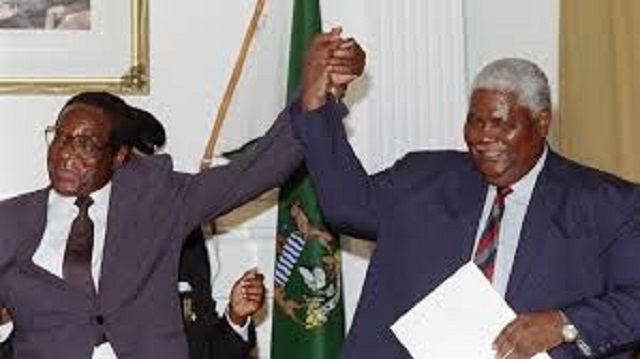ED hails Unity Accord
Share

Harare (New Ziana) – Describing the signing of the 1987 Unity Accord between Zanu and PF Zapu as a fine moment in the country’s history, President Emmerson Mnangagwa on Wednesday encouraged present and future leaders to utilise dialogue to resolve differences, in tribute to Zimbabwe’s founding fathers who put aside their egos to unite the country.
The founding fathers, the late President Robert Mugabe and Vice President Dr Joshua Nkomo, penned the unity accord 34 years ago to end disturbances that had rocked the Southern parts of the country during the early years of independence.
In an act of selflessness and patriotism, Zanu and PF Zapu merged to create a unified and stronger party, Zanu PF which has championed peace and development over the years.
It is this unity that Zimbabweans celebrate annually in remembrance of the act which also set the foundations for economic and social development.
Addressing the nation to mark the special day, President Mnangagwa paid tribute to President Mugabe and VP Nkomo for their role in extinguishing the conflict.
“The key lesson from this preceding era of internal conflict should never be lost to us. Whatever differences and contradictions we face, or are likely to face in the future, these should always find resolution through peaceful dialogue in the interest of peace and national unity. Nothing beats sitting down as one people to iron out any differences that exist or might arise. Peace in our Nation remains the foremost prize for which no price is too big to pay, no cause or ego too big to bend. We are one, indivisible people, circumscribed by this our one Nation, built on this the only geo-political space we can ever have as Zimbabweans,” he said.
“On this day we thus stand back and reflect on the development which turned the fortunes of our nation, indeed which spared our nation the hurtful cycle of internal conflict which has characterised post-liberation Africa.
“On behalf of you all, and of our entire nation, I want to pay tribute to our two visionary leaders, and to all those they worked with in forging and making this glorious day. Indeed so much work went into making this elusive development a reality. So many meetings, countless false starts, seemingly insurmountable points of differences yet all getting resolved in the end, against the firm resolve to work for, and win the peace and national unity for our nation. We are truly grateful to these two great men.”
President Mnangagwa said the two liberation movements, ZANU and PF ZAPU, which had successfully prosecuted the war of liberation, rose to the occasion when the peace they had fought hard to achieve was under threat during the delicate, early years of Independence.
“Even though the signatories to the Unity Accord were two sister Liberation movements, the threat and menace which that Accord cured and resolved was a national one. Equally, the benefits accruing from it remain national in character. Those two considerations alone, make the Unity Accord larger than the two signatories, catapulting it into the coveted status of a National Gain, Resource and Heritage.
“This, in effect, means the Unity Accord is our asset together as Zimbabweans. There should never be barriers of politics, colour, creed, language, region or tribe standing between us and its collective ownership. Illustratively, all political formations in the country confirm it, one way or the other, through their structures and leadership choices. That makes the Unity Accord a common possession, indeed a timeless guiding ethos. Our Nation stands by it, or perishes for want of it.”
President Mnangagwa said government was implementing several strategies to correct historical imbalances, some which were born out of the 1980’s conflict.
One such strategy was the devolution programme, which he said ceded decision-making and resources to communities who are now empowered to draw up and implement their own developmental plans.
“We have started witnessing the benefits of Devolution. Across the length and breadth of our nation, there is hardly any community in which some development activity is not taking place. Roads are being built; dams are being constructed and, lately, signature projects for rural industrialisation and development are being rolled out,” he said.
“Fellow countrymen and women, we are well on the road to putting content to the Unity Accord whose interpretation must now go beyond conflict resolution, to encompass peace-building through even development.
“The Unity Accord of 1987 today stands out as an Accord enabling spatially balanced, inclusive, community-driven development. It is never an Accord or concept frozen in time or history. Rather, it is a dynamic which interacts with time and circumstances as our nation evolves along its chosen trajectory.”
New Ziana







